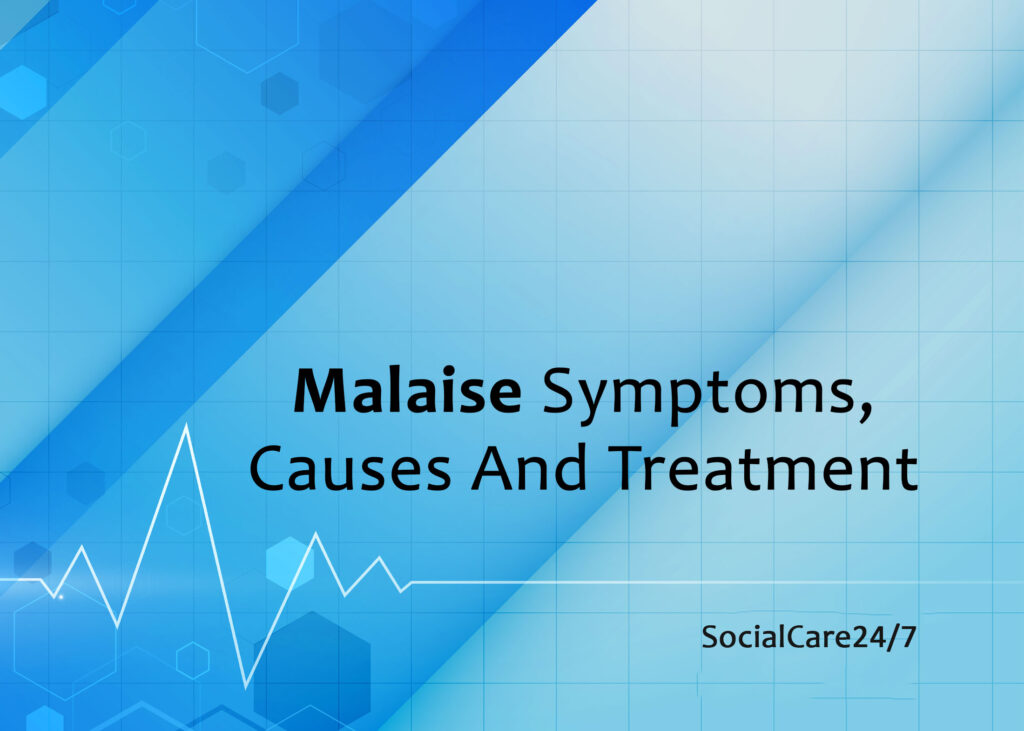Unexpected illness can be scary. Physical, emotional, and mental factors can create malaise, discomfort, weakness, or disquiet. This symptom affects many people. Malaise doesn’t cause a disease, although it typically indicates one.
This article details the symptoms, causes, and therapies of malaise, providing a thorough picture of this complex condition.
Definition of Malaise
Malaise denotes constant sickness or anxiety. It suggests your mind or body isn’t working well, not sick. Malaise is a general feeling of unease that may encompass bodily, mental, or emotional pain. Tiredness suggests you lack energy. Depressed folks may remark they’re “feeling off” or sick even without symptoms.
This foggy feeling may be mild to overwhelming and accompany fever, muscle aches, or problems with concentration. Early detection of malaise can help identify and cure causes.
Sickness Signs
Malaise has numerous symptoms that vary by cause. Common emotional and physical symptoms include
Physical symptoms
- Joint discomfort
- Fever, chills
- Tired or exhausted
- Headache
- Weight loss without explanation
- Sore throat or flu-like symptoms
- Cramps or abdominal pain
Psychological and emotional symptoms
- Stress and rage
- Depressed or moody
- Trouble concentrating or forgetting
- Feeling tired and unmotivated
Malaise with chest pain, trouble breathing, or paralysis can be life-threatening. In these instances, immediate medical attention is crucial.
Does Malaise Indicate COVID-19?
Post-exertional malaise (PEM) acquired more attention following the COVID-19 epidemic. PEM features long-term COVID-19 and chronic fatigue syndrome (CFS). It means mental or physical activity worsens fatigue and other symptoms.
COVID-19 can cause chronic fatigue, commonly known as post-acute sequelae of SARS-CoV-2 infection. After recovering from COVID-19, people may feel nauseated and exhausted, headaches, and muscle soreness for weeks or months. If these symptoms persist, visit a doctor for extended COVID management and therapy.
Causes of Malaise
Long-term ailments, short-term illnesses, and lifestyle choices cause malaise.
Long-term illness
- Chronic fatigue syndrome: Extreme fatigue and PEM indicate this issue.
- Stress, Depression: Malaise generally indicates emotional distress.
- Self-defense illnesses: Rheumatoid arthritis and lupus can prolong malaise.
- Long COVID-19: Signs and symptoms after a COVID illness
- Inflammatory gut diseases: Crohn’s and ulcerative colitis.
- Sleep issues: Sleep apnea and insomnia can make it hard to sleep.
Acute Illness
Getting sick: Flu, bronchitis, and mononucleosis might cause temporary discomfort.
Lyme disease: Early symptoms include malaise and illness.
UTIs (urinary tract infections): Can make you tired and uncomfortable in general.
Sepsis: A life-threatening infection reaction that makes you unwell.
Lifestyle factors
- Not sleeping enough
- Not getting enough nutrients or eating poorly.
- Too much alcohol or caffeine
- Too much stress or inactivity
Sometimes, antihistamines, beta-blockers, and antidepressants make people feel awful. Cause identification is essential for proper treatment.
When To See A Doctor
When symptoms don’t go away or worsen, see a doctor. Get medical attention immediately if:
- Chest pain or pressure
- Having problems breathing
- A temperature over 101°F (38.3°C)
- Unexpected muscle stiffness or paralysis
If you feel bad for more than a few days and have other symptoms, it may indicate a significant issue. Early diagnosis allows timely treatment and better health outcomes.
How Doctors Diagnose Illness
It takes several steps to determine the illness’s cause:
Medical history and physical test
Doctors begin with a medical history, including current medications, lifestyle habits, and recent illnesses or stressful events. A physical test helps identify symptoms and issues.
Lab tests
- Checking blood for diseases, anemia, or thyroid issues
- Checking urine for UTIs or renal problems
- Scanning with X-rays or MRIs to discover hidden issues
Patient Questionnaire
Questions to ask patients include:
- When and how long effects last
- Emotions like anxiety or despair
With these steps, sickness causes are easy to determine. This helps you plan better treatment.
Treatment of Malaise
Treatment for lethargy must address the root cause.
For Physical Causes
- Medicines: Muscle and joint painkillers, antibiotics, and antivirals.
- Therapy: Physical activity may relieve severe pain.
For mental and emotional reasons
- Counselling: CBT helps sad and nervous people.
- Medicines taken: Doctors may prescribe antidepressants or anxiety medications.
Lifestyle changes
- Get adequate sleep and eat well.
- Consume less caffeine and alcohol.
- Yoga, meditation, and mild exercise can reduce stress.
For Long COVID or Chronic Fatigue Syndrome
- Pacing and avoiding overactivity can aid long-term COVID or chronic fatigue syndrome patients.
- Consult professionals to customize treatment strategies.
Risks of Untreated Malaise
Failure to treat malaise and its causes might cause serious issues like:
- Chronic soreness or weariness makes daily tasks difficult.
- Untreated infections, cancer, and autoimmune illnesses worsen.
- Worsening emotional and mental health can lead to depression and social withdrawal.
Following a treatment plan reduces long-term difficulties if the cause is understood.
Conclusion
Malaise isn’t easy to explain, yet it’s a body message of trouble. People with health difficulties may take charge by understanding symptoms, causes, and treatments. Even with COVID-19, chronic fatigue, or mental challenges, the appropriate test and treatment can help.
If you’re sick for an extended period, see a doctor to diagnose and treat it. Be healthy by changing your lifestyle and monitoring your health.
Source Links;
https://resources.healthgrades.com/right-care/symptoms-and-conditions/malaise



